- Home
- Heather Graham
Waking the Dead Page 8
Waking the Dead Read online
Page 8
Notwithstanding her strange nocturnal frenzies at the canvas.
* * *
At the library, Danni leafed through book after book. She’d tried working online, but when it came to art, the best resources—in her opinion, anyway—could be found in a museum or at a library. Some books simply weren’t available online or for digital readers; this was especially true of expensive reference books that featured color reproductions.
Much of what she read she was already familiar with. Henry Sebastian Hubert had been born in 1790, making him twenty-six when he had rented a castle, the House of Guillaume, at Lake Geneva in the summer of 1816.
And he’d been twenty-six when he died. Like Shelley, he’d had a wife, a woman named Eloisa, who’d been left behind in England with their toddler son when Hubert had basically deserted her to spend his time on the shores of Lake Geneva. Maybe, had he lived, he would’ve gone back to her. But that was just Danni’s musing. She did love happy endings.
Hubert had not had a happy ending.
He’d created his first well-known work when he was in his late teens. It had been titled Graveyard at Night. It was a sad and oddly arresting piece, showing the facade of a medieval church surrounded by jagged, lichen-covered stones. His next work, more sophisticated, had been called Hanging Tree. There was no body hanging from the tree in the painting; the tree itself was the focus, skeletal and bony, seeming to move with the breeze, surrounded by shadow and ghostly images of those who’d met their deaths at the end of that one massive branch. In this painting, he’d begun his work with perspective. Of course, Danni was only looking at the reproductions in the book, but even then, she could see that, at first glance, there was nothing but the tree in the shadows and swirling dust. When she angled the page slightly, the shadows became ghosts.
Hubert had started young and by twenty-six he was well on his way. And then he’d painted Ghosts in the Mind.
When he was discovered dead, his wife had been informed, and the authorities had begun to prepare the body for transport to England.
Eloisa hadn’t wanted him back, so he’d been interred in the old crypt at the castle. His belongings were packed up and shipped back to her, and according to reputable sources, she hadn’t touched any of the paintings he’d done in Switzerland. Apparently, many people had tried to buy them from her—especially Ghosts in the Mind, since that painting had been done at the castle while Lord Byron, Shelley and Mary were an influence on his work. But she hadn’t unpacked a single crate.
At her death, her son had ordered that his father’s belongings be sold. That was in 1888. Henry Hubert’s widow had survived until the ripe old age of ninety-three, living happily off her inheritance and the proceeds from his previous artwork. She’d been quite the socialite.
The painting was purchased by a gallery in London. She’d promised the owner that, upon her death, he could buy the piece from her son.
Closing up one night, the owner was murdered. The gallery caught fire. Little attention was paid to the event, since it occurred on the same night as Jack the Ripper’s infamous murder of Mary Kelly in Whitechapel.
The painting was found in a thieves’ den where the thieves had fought over their ill-gotten gains and taken swords, pistols and knives to one another.
Danni sat back, catching her breath with a chilling sense of déjà vu.
Death followed the damned thing everywhere. Garcia’s house had been the scene of a massacre, too. She was more and more convinced that the painting had been in one of the courier packages waiting at his house. Nothing else made sense.
She looked up, gazing around the library. A woman was reading to a group of toddlers in the children’s section; a number of students were busy at computers. The library was sunny, bright, filled with activity. The world seemed good.
She looked back at the book, determined to pursue the course of the painting’s history.
It was locked away again as another twenty years went by, with police trying to sort through ownership. The gallery owner who’d been killed had died with neither wife nor child, so returning it properly became difficult.
Then, as she continued to study the painting’s provenance, she learned that an art historian, president of a small but prestigious museum in London, had acquired it at an art auction. Ghosts in the Mind was given a place of honor at his gallery in Surrey. There it was viewed by the public for several years, studied by art students. The place closed before dusk daily—and remained under guard. In January of 1915, the Germans attacked London with their first Zeppelin raids. Five people took shelter in the gallery that night.
All were killed. It was impossible to tell just what had happened; the city had been hard hit. Their bodies were pulled from the wreckage.
But the terror of war meant nothing to a particular French visitor to the city—Jacques Duchanel, who dug through the remains of the bombed gallery and found Hubert’s legendary Ghosts in the Mind. He saw that the painting was carefully wrapped and carried it back to France, installing it in his private gallery in the city of Nice. The next night, Duchanel was shot dead in front of the painting. The police had heard a commotion, but were never able to identify or track down Duchanel’s assailant.
After that, Ghosts in the Mind was stored in a warehouse, where it remained until it wound up at a Paris museum right before the beginning of World War II. Then a Nazi general of the occupying force took the painting to the castle where he was staying. It was assumed that he was attacked by the French Resistance. He and seven of his men were murdered. The painting had disappeared.
It next appeared in Central America, arriving on a ghost ship. The author believed the painting had either been found or stolen by the general’s friends—Nazis, too—who were fleeing the continent in 1945. They departed on an Italian ship that reached Panama, but by that time they were all dead, by suicide, or because someone had figured out who they were. The painting had again disappeared; however, it eventually made its way to Brazil. It arrived in Rio de Janeiro on a small boat; there were no people on the boat, but there was a great deal of blood. It was assumed that the boat was attacked, the passengers and crew killed and dumped overboard. But there were still a number of Nazi-stolen treasures aboard. If pirates had seized her, they hadn’t known much about art.
The information in that book ended, no doubt because it was published in 1949. Frustrated, Danni sat back.
She made copies of the pages that had to do with Henry Sebastian Hubert and Ghosts in the Mind, and went onto one of the computers. Using what she’d already learned, she found a site that seemed to have more recent and accurate information.
One headline read Henry Sebastian Hubert’s Famous and Infamous Ghosts in the Mind Surfaces Again—Sold at Auction in Seven Figure Range!
Danni skimmed the article and focused on the painting’s arrival in Brazil. There was a rumor that bad things had happened, even to those who’d just handled the painting. In this case, they were, of course, suspected to have been other Nazis who’d fled, as well, and thus their deaths were put down to revenge.
Then, somehow, a Nazi general safely ensconced in South America got hold of the painting, which he quickly secured in a storage facility. Finally, after his death, it was hung in a major gallery. A few months later, that area of Rio was heavily assaulted by gangs, and there’d been a shoot-out at the museum. A number of men were found dead there. They were suspected of being gang members who’d fought among themselves. The director of the museum, while picking up the pieces, gave a press conference. He said that in the interests of world harmony, he saw fit at this time to return the painting to its rightful place at the West Bank gallery in Paris. The gallery’s director thanked the Brazilian director—and promptly put the painting up for auction at a prestigious auction house, where bids immediately began to arrive. The name of the purchaser was withheld at his or her request, but giclée copies were promised so that all could marvel at the talent of this artist who’d perished at such a young age.
>
Danni sat back again, gazing blankly at the computer screen.
The buyer had to be from New Orleans; she was absolutely sure the painting had been at the Garcia house.
But where was it now?
And why was she creating images from it?
* * *
Danni wasn’t home and she wasn’t answering her cell. So Quinn called Billie, but all he managed to do was upset him. He tried to reassure Billie that Danni had her phone off or she’d left it in the car. Meanwhile, he made a mental note to beg her to be careful and to have it with her and on while they figured out just what was happening.
He was impatient and worried; the painting had to be found and found fast. It was a miracle that no one had been killed during the chaos at the police station. Quinn didn’t know how the painting was evil or how it worked. He didn’t know if a living person had to chant something or speak to it, invoke a curse or what, but somehow, the painting was a killer.
He drove to Hattie Lamont’s house on Esplanade Avenue. Larue had already sent men out to see Lamont and her butler, a sketch artist among them. No one, however, could force her to give the police her work of art, not unless they could prove it was crucial evidence and not without a district attorney weighing in.
He needed to see her himself.
Finding a place on Esplanade where he could wedge his car wasn’t easy, but once he had, he leaped out and stared up at the mansion. The home was on a truly grand scale. It had to be at least ten thousand square feet. The house featured a broad front porch with a swing, surrounded by gardens in the few feet of lawn before the street. There was a picket fence, but when he tried it, the gate was locked.
He hopped over it, hoping the woman didn’t own a rottweiler.
She didn’t. He made it to the porch with no problem and rang the bell.
The door was opened by a regal-looking older woman.
“Mrs. Lamont?”
“No, sir. May I help you?”
“I need to see Mrs. Lamont.”
“Hold on.” The door closed in his face.
No one came back. He rang the bell again.
This time, the door was opened by a butler. A real, live butler, dressed in livery. He was tall, heavy-set and balding. He could have doubled as a bodyguard. Maybe he did.
“Sir, you have entered the lawn uninvited and are trespassing,” the butler said. “Kindly remove yourself from the property.”
Quinn stood his ground. “It’s imperative that I see Mrs. Lamont.”
“Mrs. Lamont deems it imperative that you remove yourself from her property,” he repeated.
“You don’t understand. Tell her it’s a matter of life and death.”
“I believe I understand, sir. You do not. Mrs. Lamont will shoot you if you trespass on her property.”
“I’m referring to this being a matter of her life or death,” Quinn said.
“Mrs. Lamont is resting. She has been annoyed enough by the police. She is not accepting visitors at this time.”
“Let me see someone else, then.”
“I am her only live-in employee, sir. Mrs. Lamont handles her own business affairs.”
“Please listen. My name is Michael Quinn. I—”
“Mrs. Lamont does not care what your name is.”
“She is in possession of property that can kill her.”
“Mrs. Lamont thinks you are mentally unstable, sir.”
“Mrs. Lamont hasn’t met me yet!”
“No, sir. Nor does she intend to. She has informed the police that if they have any thought of demanding she hand over her property, they had best come back with all the proper legal documents.”
“So you know why I’m here.”
“I assume, sir.”
“Five people were brutally murdered over that painting.”
“That is regrettable.”
“If you’ll just let me talk to her—”
“Wait? What’s that, Mrs. Lamont?” The butler interrupted him, turning to face the house and cupping a hand to his ear.
“Oh, yes!” the butler said. “Mrs. Lamont says...”
The man smiled at Quinn.
And slammed the door.
Chapter Five
LEAVING THE LIBRARY, Danni dug her phone out of her purse. She grimaced when she saw that Quinn had called five times. Going into the library, she’d set it on silent mode.
She quickly called him back.
“There you are,” he answered. “Good thing I don’t scare easily—but you’d better give Billie a call because he was concerned when I couldn’t reach you.”
“I’m sorry, I’m sorry,” she said. “I was in the library. I hate people who let their phones ring and... Sorry. So what is it? What’s wrong? Where are you?”
“Where am I?” he asked in reply. “Hmm. Standing on the street.”
“Okay. What street? And why?”
“The things that went missing from the evidence lockup yesterday were delivered to their rightful owners. No one knows how, and a sketch artist was sent to do pictures of the person or persons who made the deliveries. Anyway, I decided to head for Ghosts in the Mind. It was bought by a very rich and not terribly pleasant woman named Hattie Lamont who has a very nasty butler,” Quinn told her. “And apparently this butler signed for the package, so he’s the only one who saw the alleged delivery person.”
“Well...the police need to get that painting!” Danni said indignantly.
“Yes, I had the same feeling. There has to be a warrant first. And the fact that murders took place and relevant objects disappeared from the police station means very little when it comes to private-property laws. Not only did the objects disappear, the computer logs did, too. And don’t tell me nothing disappears from a computer. So, it can’t really be proven that these things were at the Garcia house from the get-go—despite the fact that the shipping company knew he stored deliveries in his house for early-morning runs. Anyway, Larue’s trying to get warrants.”
“Hattie Lamont,” she said thoughtfully.
“You know her?”
“I believe so. It took me a minute. She bought one of my oil paintings. It’s a view of Jackson Square at night.”
“Did you get seven figures for it?”
“No.”
“You should have,” he said gruffly. “You know she’s got the painting, right? The Hubert.”
“Yes, so it seems. I’ve been researching the history. Quinn! Death has followed that thing since its creation. There’s an interesting piece of information I gained from all my reading.”
“What’s that?”
“It seems the painting can only be, er, active, I guess, at night. In any event, that’s when all the deaths and relevant crimes took place.”
She could almost see him checking his watch; despite the fact that the time was shown on cell phones, Quinn always wore a watch.
“It’s almost four, and I didn’t have lunch, so I’m hungry. I’ll leave my car on Esplanade and meet you at a restaurant.” He paused. “Let’s go to Port of Call. The house is within easy walking distance from there. Maybe you can get in to see her.”
“Maybe,” Danni said doubtfully. “But—”
Quinn hung up before she could say anything else.
Danni thought she’d find a place to park on Esplanade. But parking turned out to be more of a problem than she’d expected, and she decided she should just have taken her car home. By the time she reached Quinn at the restaurant, he’d finished his meal and was looking very impatient, although he didn’t say anything.
She sat across from him and touched his arm, hoping to erase his scowl. “I’m sorry. It took me a while to park. Big mistake—”
“It’s okay. At least you didn’t slam a door in my face.”
“The mean old woman slammed a door in your face?”
“No, she had the butler do it.”
“The butler did it?” She couldn’t help giggling. Then she grew serious, wondering how she’d
get the woman to let her in. And once she was in...what was she going to say?
“Somehow, we have to talk her into giving up that painting,” Quinn said.
“She’s worth a fortune. I’m sure the place has security up to the rafters,” Danni said. She looked at him sharply. “You can’t be thinking about breaking into her house!”
“I’m seriously thinking about it,” Quinn muttered. “Jake Larue did suggest I bring you, but, honestly, I didn’t even get a chance to say anything about you. I guess after the police spoke with her this morning, she’s holding on to her painting with an iron grip.”
Their waitress came, and Danni ordered. A moment later, she received a giant iced tea and a bowl of gumbo. Come to think of it, she hadn’t eaten lunch, either. She sipped her tea slowly and enjoyed every spoonful of the gumbo.
“All right,” she finally told him. “I’ll go to the house.”
“With me?”
“Alone. Maybe she won’t be as intimidated by a woman.”
“I never saw her, just some skinny old broad who opened the door, and then the butler showed up.”
“I’m pretty sure Hattie Lamont was your skinny old broad, and I don’t think she’d appreciate the description.”
“Well, fine. And I don’t like doors slammed in my face—especially when I’m trying to save someone’s life.”
“Hang around on the street. I’ll see if I can get in.”
She finished her meal, well aware that Quinn was controlling his impatience. He drank another coffee while he waited.
When they were done, they walked down to the beautiful mansion where Hattie Lamont lived. Danni tried the gate.
“You have to hop over it,” Quinn explained.
She waved a hand at him and frowned, warning him to get out of sight. Once he’d moved away, she found a small button on the gate and pressed it. From inside the house, she heard a buzzer.
The door opened cautiously. She saw Hattie Lamont peering out.
She knew a little about the woman and what she knew wasn’t bad. Hattie was a widow, a very rich one. Her husband had made the Forbes top hundred several times; she’d inherited it all. Hattie had fallen in love with New Orleans. She gave to all kinds of projects in the city and had made a huge donation to build a shelter for battered wives and their children—and she’d even seen to it that there was a shelter for battered husbands.

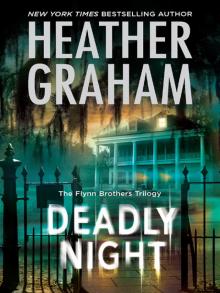 Deadly Night
Deadly Night The Uninvited
The Uninvited Dust to Dust
Dust to Dust Heart of Evil
Heart of Evil A Perfect Obsession
A Perfect Obsession The Keepers
The Keepers Pale as Death
Pale as Death Phantom Evil
Phantom Evil Hallow Be the Haunt
Hallow Be the Haunt Night of the Wolves
Night of the Wolves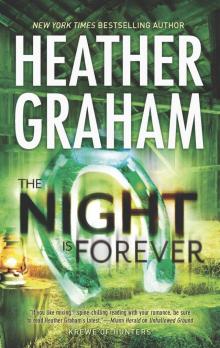 The Night Is Forever
The Night Is Forever Golden Surrender
Golden Surrender Kiss of Darkness
Kiss of Darkness Beneath a Blood Red Moon
Beneath a Blood Red Moon A Dangerous Game
A Dangerous Game Ghost Shadow
Ghost Shadow Long, Lean, and Lethal
Long, Lean, and Lethal Fade to Black
Fade to Black The Rising
The Rising And One Wore Gray
And One Wore Gray Rebel
Rebel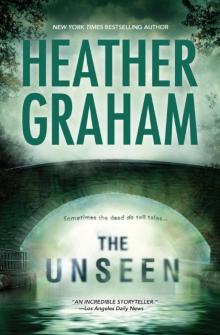 The Unseen
The Unseen The Night Is Watching
The Night Is Watching The Evil Inside
The Evil Inside The Unspoken
The Unspoken The Night Is Alive
The Night Is Alive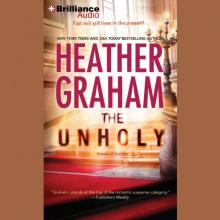 The Unholy
The Unholy Nightwalker
Nightwalker Deadly Harvest
Deadly Harvest An Angel for Christmas
An Angel for Christmas A Pirate's Pleasure
A Pirate's Pleasure American Drifter
American Drifter Realm of Shadows
Realm of Shadows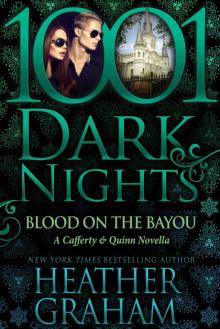 Blood on the Bayou
Blood on the Bayou Sacred Evil
Sacred Evil Dying to Have Her
Dying to Have Her The Cursed
The Cursed Captive
Captive Hurricane Bay
Hurricane Bay Drop Dead Gorgeous
Drop Dead Gorgeous Ghost Memories
Ghost Memories All Hallows Eve
All Hallows Eve Dying Breath
Dying Breath Deadly Fate
Deadly Fate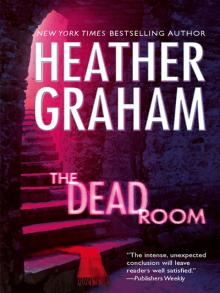 The Dead Room
The Dead Room Lord of the Wolves
Lord of the Wolves Ghost Night
Ghost Night Ghost Walk
Ghost Walk The Forgotten
The Forgotten Unhallowed Ground
Unhallowed Ground One Wore Blue
One Wore Blue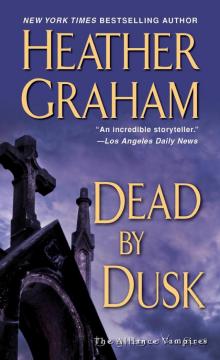 Dead By Dusk
Dead By Dusk Night of the Blackbird
Night of the Blackbird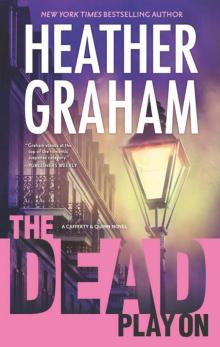 The Dead Play On
The Dead Play On Bride of the Night
Bride of the Night Wicked Deeds
Wicked Deeds The Forbidden
The Forbidden Triumph
Triumph Out of the Darkness
Out of the Darkness Love Not a Rebel
Love Not a Rebel The Last Noel
The Last Noel Tall, Dark, and Deadly
Tall, Dark, and Deadly The Death Dealer
The Death Dealer Dead on the Dance Floor
Dead on the Dance Floor Law and Disorder
Law and Disorder Dark Rites
Dark Rites New Year's Eve
New Year's Eve Hostage At Crystal Manor
Hostage At Crystal Manor And One Rode West
And One Rode West Home in Time for Christmas
Home in Time for Christmas Killing Kelly
Killing Kelly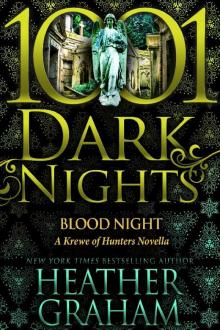 Blood Night
Blood Night Tangled Threat (Mills & Boon Heroes)
Tangled Threat (Mills & Boon Heroes) Darkest Journey
Darkest Journey Glory
Glory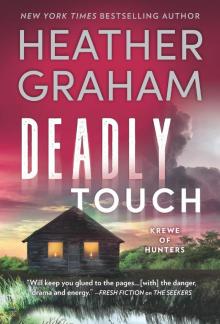 Deadly Touch
Deadly Touch An Unexpected Guest
An Unexpected Guest Night of the Vampires
Night of the Vampires Seize the Wind
Seize the Wind Ghost Moon
Ghost Moon The Vision
The Vision Dreaming Death
Dreaming Death Conspiracy to Murder
Conspiracy to Murder Horror-Ween (Krewe of Hunters)
Horror-Ween (Krewe of Hunters)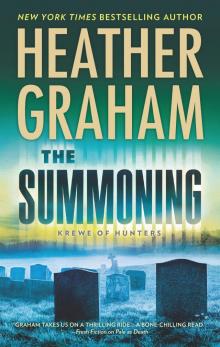 The Summoning
The Summoning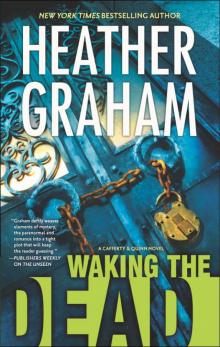 Waking the Dead
Waking the Dead Danger in Numbers
Danger in Numbers The Hidden
The Hidden Sweet Savage Eden
Sweet Savage Eden Tangled Threat ; Suspicious
Tangled Threat ; Suspicious Mother's Day, the Krewe, and a Really Big Dog
Mother's Day, the Krewe, and a Really Big Dog Picture Me Dead
Picture Me Dead The Killing Edge
The Killing Edge St. Patrick's Day
St. Patrick's Day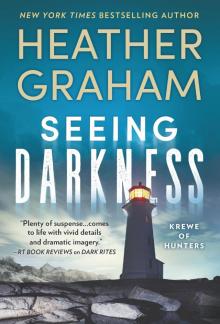 Seeing Darkness
Seeing Darkness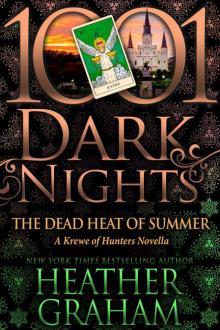 The Dead Heat of Summer: A Krewe of Hunters Novella
The Dead Heat of Summer: A Krewe of Hunters Novella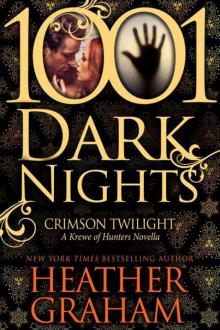 Crimson Twilight
Crimson Twilight Haunted Destiny
Haunted Destiny Devil's Mistress
Devil's Mistress Banshee
Banshee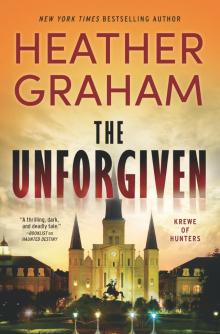 The Unforgiven
The Unforgiven The Final Deception
The Final Deception A Horribly Haunted Halloween
A Horribly Haunted Halloween Haunted Be the Holidays
Haunted Be the Holidays Deadly Gift
Deadly Gift Easter, the Krewe and Another Large White Rabbit
Easter, the Krewe and Another Large White Rabbit Haunted
Haunted The Silenced
The Silenced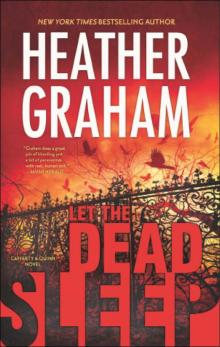 Let the Dead Sleep
Let the Dead Sleep Christmas, the Krewe, and Kenneth
Christmas, the Krewe, and Kenneth Big Easy Evil
Big Easy Evil Sinister Intentions & Confiscated Conception
Sinister Intentions & Confiscated Conception Haunted Be the Holidays: A Krewe of Hunters Novella
Haunted Be the Holidays: A Krewe of Hunters Novella Blood Red
Blood Red A Perilous Eden
A Perilous Eden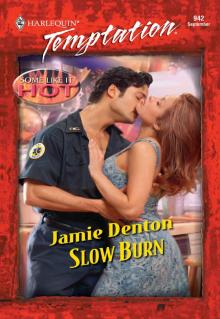 Slow Burn
Slow Burn Strangers In Paradise
Strangers In Paradise Bitter Reckoning
Bitter Reckoning Krewe of Hunters, Volume 1: Phantom Evil ; Heart of Evil ; Sacred Evil ; The Evil Inside
Krewe of Hunters, Volume 1: Phantom Evil ; Heart of Evil ; Sacred Evil ; The Evil Inside Do You Fear What I Fear?
Do You Fear What I Fear? The Face in the Window
The Face in the Window Krewe of Hunters, Volume 3: The Night Is WatchingThe Night Is AliveThe Night Is Forever
Krewe of Hunters, Volume 3: The Night Is WatchingThe Night Is AliveThe Night Is Forever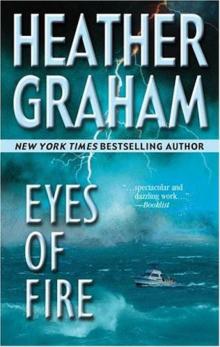 Eyes of Fire
Eyes of Fire Apache Summer sb-3
Apache Summer sb-3 Sensuous Angel
Sensuous Angel In the Dark
In the Dark Knight Triumphant
Knight Triumphant Hours to Cherish
Hours to Cherish Tender Deception
Tender Deception Keeper of the Dawn tkl-4
Keeper of the Dawn tkl-4 Apache Summer
Apache Summer Between Roc and a Hard Place
Between Roc and a Hard Place Echoes of Evil
Echoes of Evil The Game of Love
The Game of Love Sacred Evil (Krewe of Hunters)
Sacred Evil (Krewe of Hunters) Bougainvillea
Bougainvillea Tender Taming
Tender Taming Keeper of the Night (The Keepers: L.A.)
Keeper of the Night (The Keepers: L.A.) Lonesome Rider and Wilde Imaginings
Lonesome Rider and Wilde Imaginings Lucia in Love
Lucia in Love The Gatekeeper
The Gatekeeper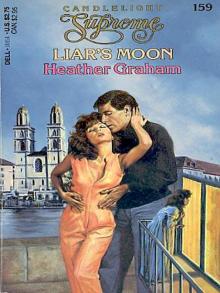 Liar's Moon
Liar's Moon Dark Rites--A Paranormal Romance Novel
Dark Rites--A Paranormal Romance Novel A Season for Love
A Season for Love Krewe of Hunters, Volume 6: Haunted Destiny ; Deadly Fate ; Darkest Journey
Krewe of Hunters, Volume 6: Haunted Destiny ; Deadly Fate ; Darkest Journey Keeper of the Dawn (The Keepers: L.A.)
Keeper of the Dawn (The Keepers: L.A.)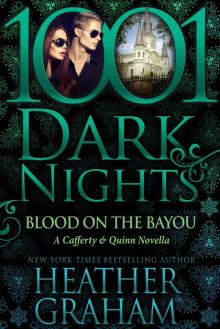 Blood on the Bayou: A Cafferty & Quinn Novella
Blood on the Bayou: A Cafferty & Quinn Novella Double Entendre
Double Entendre A Perfect Obsession--A Novel of Romantic Suspense
A Perfect Obsession--A Novel of Romantic Suspense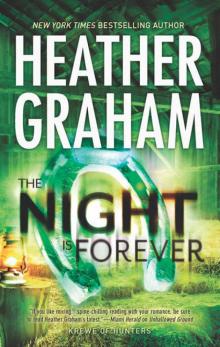 The Night Is Forever koh-11
The Night Is Forever koh-11 The Di Medici Bride
The Di Medici Bride When Irish Eyes Are Haunting: A Krewe of Hunters Novella
When Irish Eyes Are Haunting: A Krewe of Hunters Novella The Keepers: Christmas in Salem: Do You Fear What I Fear?The Fright Before ChristmasUnholy NightStalking in a Winter Wonderland (Harlequin Nocturne)
The Keepers: Christmas in Salem: Do You Fear What I Fear?The Fright Before ChristmasUnholy NightStalking in a Winter Wonderland (Harlequin Nocturne)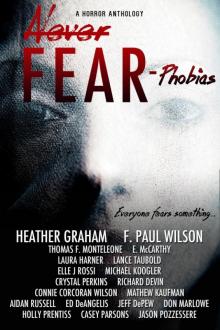 Never Fear
Never Fear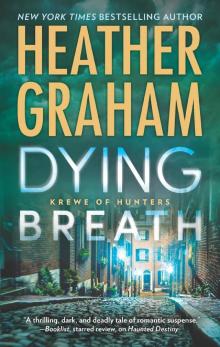 Dying Breath--A Heart-Stopping Novel of Paranormal Romantic Suspense
Dying Breath--A Heart-Stopping Novel of Paranormal Romantic Suspense If Looks Could Kill
If Looks Could Kill This Rough Magic
This Rough Magic Heather Graham's Christmas Treasures
Heather Graham's Christmas Treasures Hatfield and McCoy
Hatfield and McCoy The Trouble with Andrew
The Trouble with Andrew Never Fear - The Tarot: Do You Really Want To Know?
Never Fear - The Tarot: Do You Really Want To Know? Blue Heaven, Black Night
Blue Heaven, Black Night Forbidden Fire
Forbidden Fire Come the Morning
Come the Morning Dark Stranger sb-4
Dark Stranger sb-4 Lie Down in Roses
Lie Down in Roses Red Midnight
Red Midnight Krewe of Hunters Series, Volume 5
Krewe of Hunters Series, Volume 5 Night, Sea, And Stars
Night, Sea, And Stars Snowfire
Snowfire Quiet Walks the Tiger
Quiet Walks the Tiger Mistress of Magic
Mistress of Magic For All of Her Life
For All of Her Life Runaway
Runaway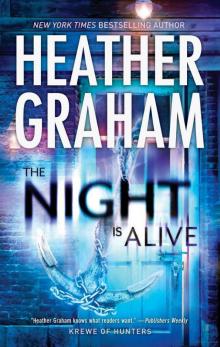 The Night Is Alive koh-10
The Night Is Alive koh-10 The Evil Inside (Krewe of Hunters)
The Evil Inside (Krewe of Hunters) All Hallows Eve: A Krewe of Hunters Novella (1001 Dark Nights)
All Hallows Eve: A Krewe of Hunters Novella (1001 Dark Nights) Tomorrow the Glory
Tomorrow the Glory Ondine
Ondine Angel of Mercy & Standoff at Mustang Ridge
Angel of Mercy & Standoff at Mustang Ridge Bride of the Tiger
Bride of the Tiger When Next We Love
When Next We Love Heather Graham Krewe of Hunters Series, Volume 4
Heather Graham Krewe of Hunters Series, Volume 4 A Season of Miracles
A Season of Miracles Realm of Shadows (Vampire Alliance)
Realm of Shadows (Vampire Alliance) When We Touch
When We Touch Serena's Magic
Serena's Magic Rides a Hero sb-2
Rides a Hero sb-2 All in the Family
All in the Family Handful of Dreams
Handful of Dreams A Stranger in the Hamptons
A Stranger in the Hamptons Krewe of Hunters, Volume 2: The Unseen ; The Unholy ; The Unspoken ; The Uninvited
Krewe of Hunters, Volume 2: The Unseen ; The Unholy ; The Unspoken ; The Uninvited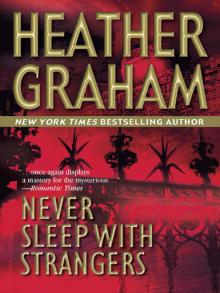 Never Sleep With Strangers
Never Sleep With Strangers Eden's Spell
Eden's Spell A Magical Christmas
A Magical Christmas Forever My Love
Forever My Love King of the Castle
King of the Castle Night Moves (60th Anniversary)
Night Moves (60th Anniversary) The Island
The Island Borrowed Angel
Borrowed Angel Hallow Be the Haunt: A Krewe of Hunters Novella
Hallow Be the Haunt: A Krewe of Hunters Novella Why I Love New Orleans
Why I Love New Orleans The Last Cavalier
The Last Cavalier A Matter of Circumstance
A Matter of Circumstance Heather Graham's Haunted Treasures
Heather Graham's Haunted Treasures Tempestuous Eden
Tempestuous Eden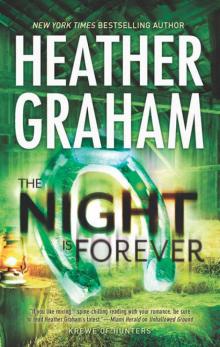 Krewe 11 - The Night Is Forever
Krewe 11 - The Night Is Forever